Church Reconciliation, Unimpeded Gospel: Peacemaker Conflict Resolution Seminar
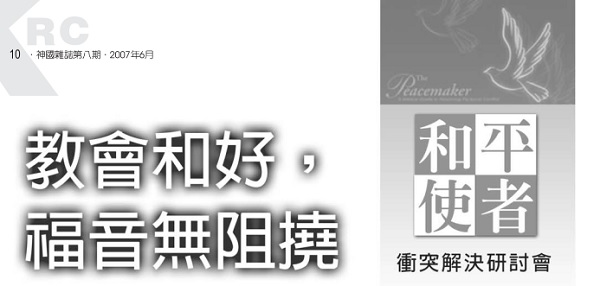
On the evening of March 24 this year (2007), I took a flight and arrived in Taiwan safely. This time, we invited lawyer Ken Sande, the founder of Peace Messenger Ministries Association, and two of his colleagues, Chip Zimmer, director of Peace Messenger International Ministry, and Jim Helfrich, came to Taiwan to host a two-day conflict resolution seminar. To this end, we have discussed on the phone again and again in the United States, prayed for a long time, revised handouts, and made complete preparations, hoping to spread the gospel and hope of reconciliation and peace to the land of the Chinese.

▲ Lawyer Ken Sande (Rightist), the founder of Peace Messenger, and Gao Lili, the founder of this magazine who serves as an interpreter, work closely together and only hope that the gospel of reconciliation will be spread throughout the Chinese churches.
Is the church equipped to face conflict?
In recent years, we have repeatedly seen disputes and divisions in the Chinese church. There are constant conflicts between believers and believers, believers and pastors, churches and churches, husbands and wives, parents and children, and friends and colleagues, and they are almost helpless. Occasionally, some responsible pastors and believers volunteer to help, but in the end they feel helpless.
When some believers gossip or backbite, or make mistakes in the workplace or business, or are even pointed out by outsiders as behaving morally and inconsistently with Christian testimony, will most churches not take action? Or just talk about it behind your back? If action is taken, will it effectively restore the brothers and sisters with grace? Or will it cause more strife and expose the church’s lack of Christ’s grace and self-righteousness?
I deeply feel that the tension between society, church, family and interpersonal relationships is becoming more and more acute, violent, intense and frequent. Christians also seem to have fallen into the mold of society and are just as horrifyingly violent when it comes to handling conflicts. I have been thinking about a question:How do Christians differ from non-Christians when it comes to conflict? In the face of conflict, can the life of Christ demonstrate the power to reverse helpless and hopeless relationships and situations?
God commands us:"How dare you seek judgment before the unrighteous rather than before the saints when you have something against one another? Don't you know that the saints will judge the world? If the world is judged by you, are you not worthy to judge this one? The smallest thing?
Don’t you know that we have to judge angels? How much more about the things of this life? That being the case, if you have any matters of this life to judge, are you sending someone whom the church despises to judge? I say this to shame you. Is there not a wise man among you who can judge in the affairs of your brothers? You are suing brother against brother, and you are suing before unbelievers. ” (1 Corinthians 6:1-6)
Christians know this intellectually, but does it work in practice? Can it be done? If we obey God’s words seriously, how can we implement this command?
Chinese peace ministry is on the rise!
A few years ago, I happened to read "Peacemaker" (the Chinese version was published by Daosheng Publishing House) written by Kende Hsieh, and I discovered that there is actually a group of people who are diligently using the teachings of the Bible to be peacemakers. I was deeply inspired and moved, so I invited young Brother Zhu Chongen to work with me to translate this book into Chinese and publish it (please read the preface of the book for details).
And the most surprising thing is that most of these people are lawyers. In the United States, hundreds of Christian lawyers follow God's Word to help people reconcile and restore relationships. One after another, cases that could not be resolved by the courts for several years, including many cases with staggering numbers (contracts worth hundreds of millions of dollars), were solved within a few weeks by their faithful obedience to God’s words and professional peacemaker reconciliation training. It is effectively solved.
Last fall, in view of the urgency of the peace ministry among the Chinese, I decided to go to Billings, Montana, where the headquarters of the Peace Messenger Ministry is located, to inform them about starting this work among the Chinese. The needs and urgency of work. (Please read the seventh issue of "The Kingdom of God Magazine" for details)
It is the Spirit of God who does the inspiring work among us. After sharing and talking in the morning, Xie Kende and his co-workers unanimously agreed that this was the guidance of God the Father and they were willing to raise up harmonious ministries among the Chinese. With their limited manpower (there are only about thirty co-workers at the headquarters) and financial resources (they were once successful lawyers, but they gave up their careers for this work and relied on faith), they are willing to spend their own money (air tickets, food and accommodation) to come with me. Taiwan hosted a two-day seminar for the church and brothers and sisters in my hometown.
Within three months, God the Father also moved Pastor Xia Zhongjian and his colleagues of the Evangelical Association to host this seminar. They are responsible for all arrangements, from venue promotion and registration to airport pick-up and three meals a day.
The seminar is scheduled to be held at Taipei Truth Hall on March 26th and 27th. The number of people exceeded the original reservation of 80 by more than 50 people. The enthusiastic registration gave us great encouragement!
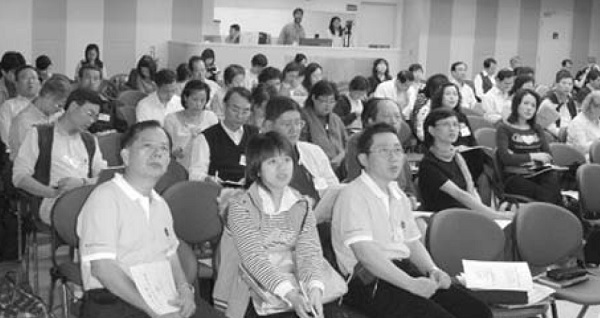
▲The seminar was held at Taipei Truth Hall on March 26 and 27, 2007. The number of people exceeded the scheduled 80 by more than 50 people. The pastor’s enthusiastic attendance gave us great encouragement!
Reconcile with God
During the seminar, Sheikende first emphasized that even in the Bible, the ideal church established by the apostles also experienced conflicting events. Building harmonious relationships is an urgent need; among Christians in North American churches, the divorce rate reaches 34%, and 1,500 pastors leave the ministry every month. People often view “making peace” as a life preserver in emergencies rather than as a way of life.
In fact, a culture of reconciliation will bring many blessings. When a church generally teaches the theology of reconciliation and cultivates a culture of reconciliation, members can often effectively resolve private conflicts, and pastors can be released from the "complaint cycle"; believers' marriages are stronger, their families are stronger, and the membership conversion rate is reduced. , the service of co-workers and volunteers will be longer and more effective. Conflict turns out to be an opportunity for people to be free from sin; to become more mature in faith, character, and love for God; and to become more unified and effective in ministry and missionary work.
Xie Kende gave a real example. In many cities and towns across America, the high school football team is the pride of the city. There was a high school football team that was expelled from the school because of the behavioral problems of several players. Due to the upcoming competition with neighboring cities, there was anger and quarrels throughout the city.
A pastor in the city just returned from the Peacemaker training camp a week ago. After much thought and prayer, he decided to step forward bravely and be a messenger of peace. He persuaded the two parties to sit down for peace talks, and guided both parties to forgive each other based on biblical principles and to formulate a plan that would satisfy both parties, resulting in a successful solution. After that, the coach of the high school football team began to come to the church. Soon, the whole family was baptized into the Lord, and many families across the city began to believe in the Lord and join the church. As Sheikende said, "Reconciliation with God puts everything in the world to shame."
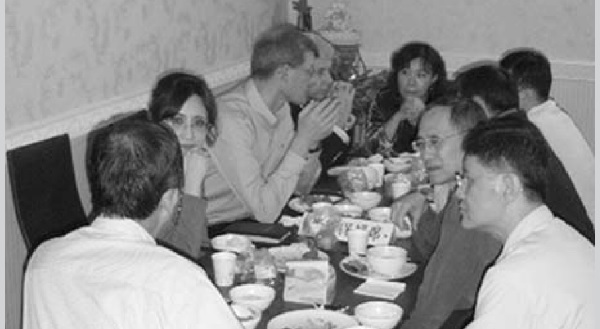
▲The participating pastors from Taiwan not only studied seriously how to be messengers of peace, but also seized the opportunity to have in-depth exchanges even during the meal.
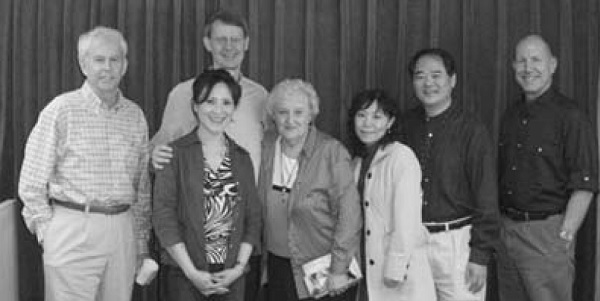
▲Peng Menghui (third from left, front row), founder of the Redemption Communication Association (ORTV), participated in and affirmed the Peace Messenger ministry. Front row from right: Peacemaker Ministry (PM) co-worker Jamie He; ORTV president Hong Shanqun; Evangelical Association Public Relations Director Sister Zheng Sujun; second from left Gao Lili; first from left Ji Qi, director of PM International Ministry; A latecomer, Xie Kende, founder of PM.
Christian Principles of Reconciliation: 4G
When ordinary people face conflicts, their instinctive reaction is often either to escape or to attack. Avoidance responses include denial (whitewashing the situation), flight (divorce, changing jobs, churches), or suicide. Aggressive reactions include attacking the other person with various words and actions. When the reaction is more intense, it can lead to litigation, and the most extreme is murder.
But Christians have a different choice. We can choose a biblical and peaceful response. The ministry of peacemakers is focused on teaching, training, and equipping believers. In this harmonious way, they serve as peacemakers and help people resolve conflicts and disputes through discussions, consultations, coordinators, and arbitrators.
Basically, Christian reconciliation is based on four principles, also known as the 4Gs of reconciliation:
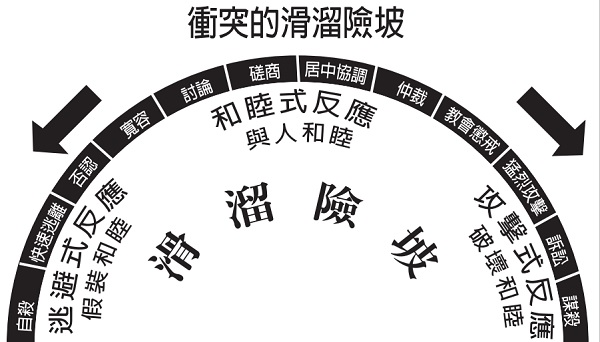
1. Glorify God: Glorify God (1 Corinthians 10:31-11:1);
Conflict resolution brings new opportunities for relationships. We should glorify God in every conflict (1 Corinthians 10:31), reveal God’s character (Ephesians 5:1), and pray and ask the Lord, “How can I please God in the midst of conflict?” And glorify Him?” Xie Kunde mentioned that such prayers are full of power, and God will definitely answer them!
2. Get the log out of your eye: Get the log out of your eye (Matthew 7:3-4);
When we are in conflict with others, Christ teaches us to first remove the plank from our own eye. Many conflicts come from one's own selfish desires. Sherlock mentioned one thing in particular that most Christians have not thought about. That is:Bad desires certainly lead to sin, but our conflicts with others often come from good desires.
He uses the example of Martha and Mary inviting Jesus to their home. Martha's desire to entertain Jesus with the best of everything was a valuable desire, but this desire was so strong that it was higher than Christ himself. "Serving Jesus with the best of everything" has evolved into Martha's idol, so Martha pooped He began to make demands on Mary, became dissatisfied with her, and finally even came into conflict with Jesus. When others do not respond to our requests, we begin to judge them, and eventually this judgment may turn into punishment.
All participants held group discussions. Everyone focused on self-examination, discussed whether they had had the same experience, and confessed and repented. Many sisters confessed that their originally good ideas in life, ministry, family, workplace, and church ended up causing conflicts with others due to their too strong desires.
3. Gently restore people trapped in sin: Gently restore people (Galatians 6:1);
When it comes to gentle restoration, one important point is that the most important thing in making peace is to use grace to restore brothers and sisters trapped in sin. When sharing what prevents us from confessing to others, everyone unanimously said that it is a matter of face.
What does the Bible say about face? After a heated discussion, the conclusion is quite unanimous: although the Bible does not directly mention "face", it also teaches us to save face. For example:"If your brother sins against you, go and tell him his fault while he is alone with you." (Matthew 18:15)Sheikend reminds us, when God the Father asked Jesus Christ to die on the cross for us, did He still have face? He does not care about His face at all, but saves face for us. Therefore, we should keep in mind that the world’s culture is to save face for ourselves, but the teaching of the Bible is to save face for others!
4. Go and be reconciled: Go and be reconciled (Matthew 5:23-24).
The fourth principle mainly lies in the compounding of relationships. When we forgive others, we should make these promises: I promise that I will not dwell on old scores; I promise that I will not use this matter against you; I promise that I will not mention this matter to others; I promise that I will not mention this matter to others; I won't let this get in the way of your relationship.
In order to effectively shepherd believers and build a healthy and growing church, a "culture of reconciliation" must be cultivated. Xie Kende shared many touching testimonies using the example of his church. The most impressive thing was that his pastor specifically stated that he had obtained permission in advance before sharing.
When the pastor came to their church twelve years ago, it was the first time he had a secretary to help him because he had served a small church before. Four months after taking office, one day the secretary complained to an elder’s wife that she was fed up with the pastor’s anger and decided to quit her job. It turned out that the secretary felt that the pastor often asked her to do things but did not know the instructions clearly. He often asked her to do things that she had not been asked to do without respecting her wishes.
The elder’s wife is a mature Christian who has been trained as a peacemaker. She told her secretary that she should talk to the pastor first and let him know her feelings and decision. After some persuasion, the secretary agreed that the elder's wife would accompany her. They first prayed together, asking God to allow the pastor to listen humbly. God really listened to their prayers. The pastor had no excuse for his behavior and asked the secretary to forgive him for his inexperience and lack of sensitivity. Finally, he retained the secretary.
After the sermon the next Sunday, the pastor asked the secretary and the elder’s wife to come to the front of the stage. Just as everyone was wondering, the pastor publicly apologized to the secretary in front of the entire congregation and thanked her and the elder's wife for being candid and giving him the opportunity to grow. The pastor went on to say that in addition to the secretary, he may have harmed other brothers and sisters unintentionally, and begged everyone to forgive and tell him so that he could continue to grow.
From then on, the church loved and respected the pastor even more, and because of the pastor’s example, the brothers and sisters had the courage to confess their sins and forgive each other, and the church became very unified!
Peacemaker Camp is waiting for you this summer!
During the seminar, three lawyer brothers often used conflicts between themselves and their families as examples to share their testimony of reconciliation without any secret. The venue was inspiring and touching from beginning to end. Many attendees shared that they saw from these three brothers what wonderful things God can do through people who obey the Lord wholeheartedly, no matter the cost: broken relationships are reunited; divided churches are united; businesses that are unresolved in court are almost broken. The contract was not only reconciled but even continued to be completed.
This seminar hopes to bring out the importance that pastoral leaders and Christians attach to the "culture of reconciliation" and their willingness to work hard to reconcile people based on the principles of God's words. Currently, the Peace Messenger Ministry is actively praying, discussing and formulating plans to continue serving the Chinese people. I hope that more Chinese Christians will be willing to devote themselves to being peace messengers.
This summer (7/16-19) Peace Messenger will hold the first series of Peace Messenger work camps at the Kingdom of God Cultural Practice Camp. We are very much looking forward to church pastors, elders, leaders, counselors, caring ministries, or anyone who has a calling from God. Invite serious people to attend (see page 78 for details).
For this trip to Taiwan, I would like to express my special thanks to Pastor Xia Zhongjian, my wife, Sister Sujun, Sister Qiling and all the lovely, admirable and respectable co-workers of the Evangelical Association. Almost every time, it is through the support and help of the Association that many of the best resources from the United States can be shared with Taiwan.
The faithful prayers behind my prayer team from the co-workers at the Peace Messenger headquarters and the co-workers from Kingdom Resources for Christ deeply moved the four of us during this journey!
Every time I return to my hometown of Taiwan, I can’t help but cry. Especially my friends’ enthusiasm and love always make me feel so unworthy and unforgettable. Originally I just had an attitude of "sacrifice and dedication", but I didn't expect to come back with full blessings. I really feel ashamed and ashamed of my thoughts and attitudes, and I am full of praise and gratitude for Father God's deeds and grace!

Lily Yang, the founder of the Christian Association of Kingdom of God Resources; a senior executive in the corporate world; a translator and author. His books such as "The Wind and Fire" and "The Purpose Driven Life" are best-selling masterpieces. He has a son with his husband, Pastor Yang Yongqing, and currently lives in Pennsylvania, the United States. .
